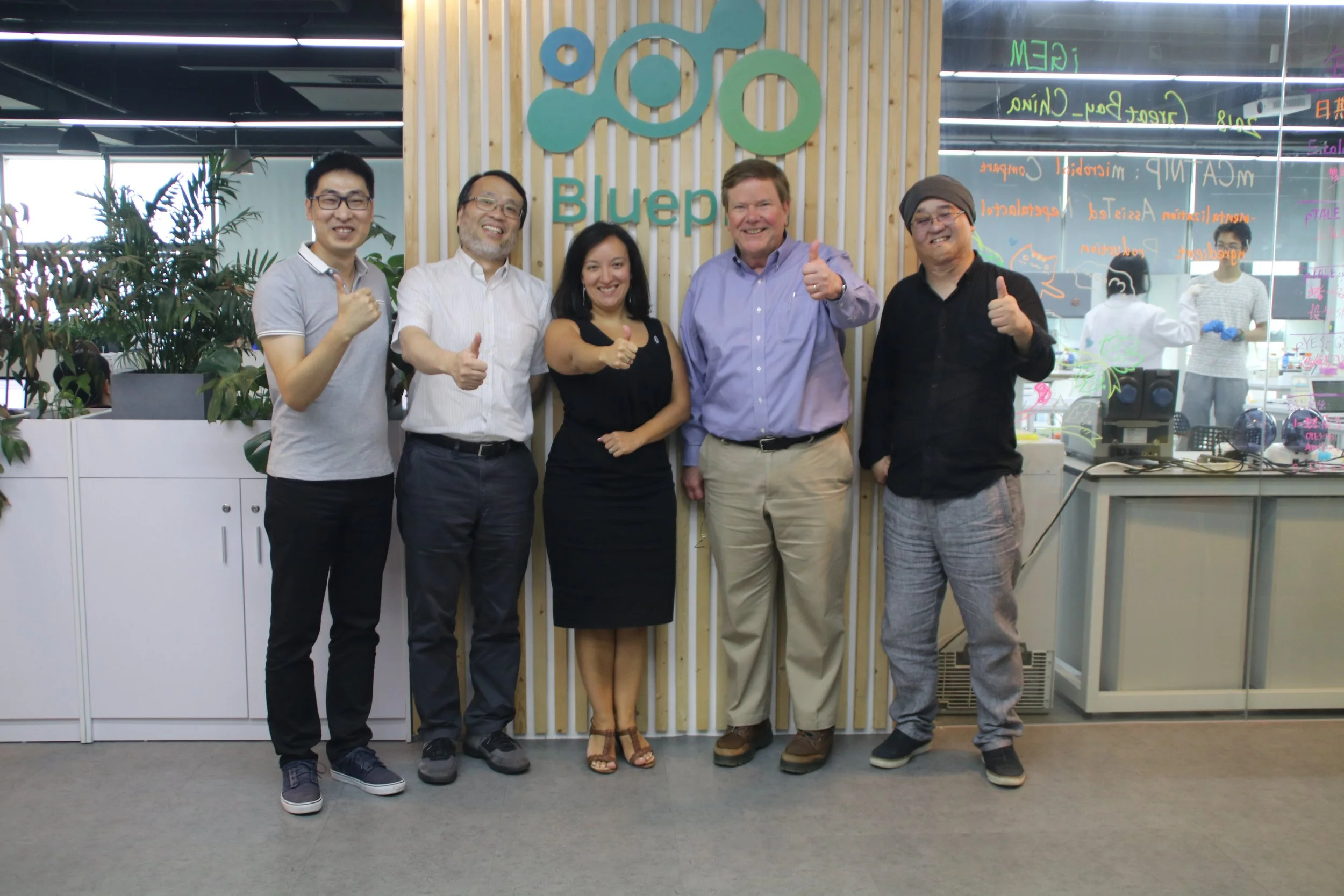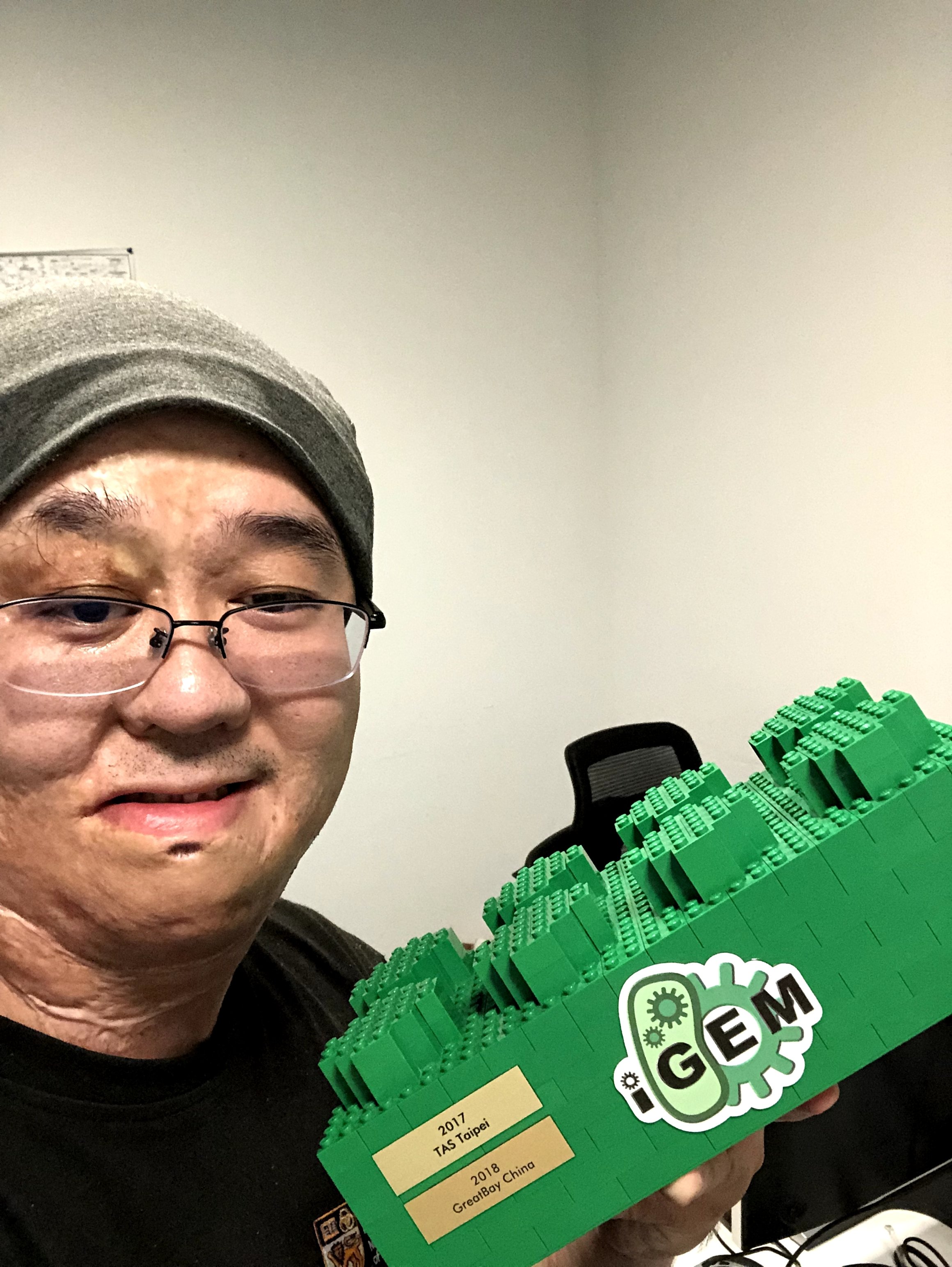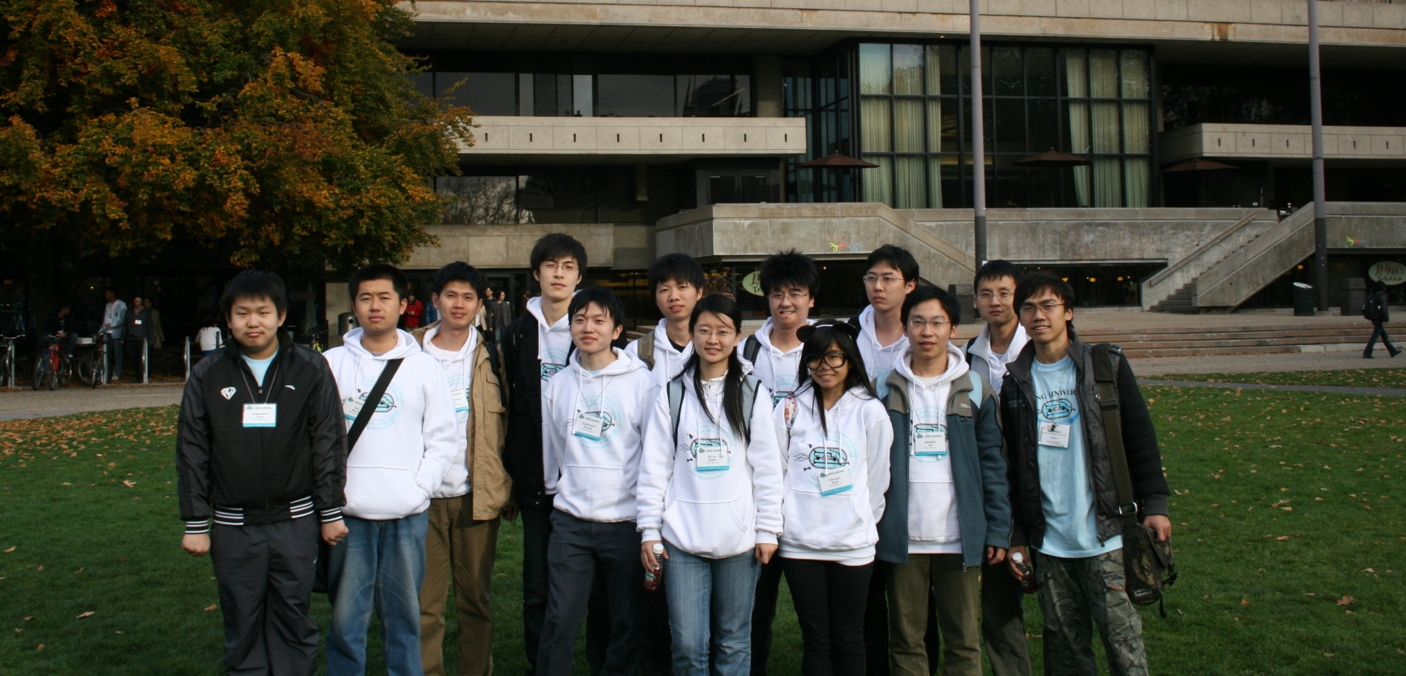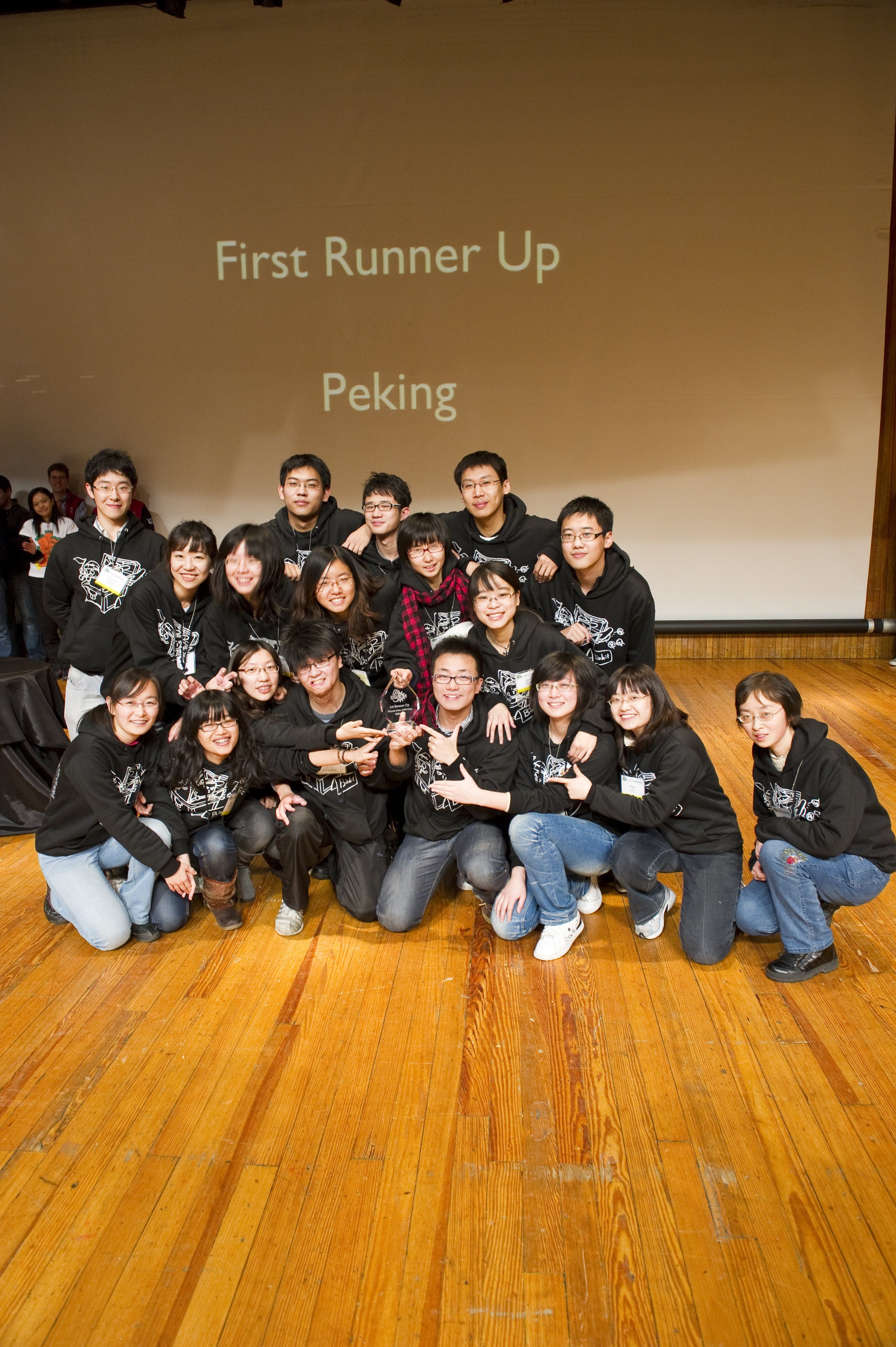Business Symbiosis with iGEM - Story of Bluepha
1. How was the idea of Bluepha conceived and how did your iGEM experience influence its creation?
Dr. Li Teng and Dr. Zhang Haoqian are co-founders of Bluepha, a successful biotech firm in China.
In the 2010 iGEM competition, they were team leaders of two top universities in China, Tsinghua University and Peking University. During the Chinese regional Jamboree, they met each other and found that somehow「great minds think alike」. They happened to see eye to eye on many things. Dr. Li Teng created the prototype at Tsinghua University.
Dr. Li Teng always has had an enormous passion for the biological industry. He believed that by using biological techniques, people could innovate and create more value for society. However, when he earned his Ph.D., he found that there were not many such opportunities.
So did Dr. Zhang Haoqian; while he was doing his Ph.D, he already got several offers for PI from a research institute. However, he thought young PI has limited developmental space under the circumstances in China.
They were trained as professional researchers, but they have been frustrated that much research remains in the laboratory stage. And limited by the realistic environment, it is difficult for young scholars to get enough resources at the beginning of their careers.
Therefore, In 2015, Dr. Li and Dr. Zhang co-founded Bluepha and devoted themselves to their own business after their Ph.D. They decided to start the first mass-production product— PHA. Dr. Li and Dr. Zhang also participated in the foundation of the largest Chinese iGEMer community— CCiC. Afterward, more and more iGEMers joined them, and more than 50% of the founding team members in Bluepha are iGEM alumni.
The policy of banning the import of foreign garbage/ why Bluepha choose PHA
The Bluepha team has been consistent with iGEM's vision since the beginning — solving practical and local problems based on synthetic biology. When Dr. Li and Dr. Zhang started their business, China began to ban the import of foreign waste. This seemingly insignificant policy disturbed the global plastics industry chain, and our country introduced the plastic prohibition order.
We realized that environmentally friendly plastic would be very valuable, so they chose the first mass-production product for our company—PHA, a new material that can be fully degraded in the natural environment. Currently, the production factory in Yancheng, Jiangsu, is under construction. If everything goes well, the quantitative production of PHA will be put into operation in the fourth quarter of this year. Bluepha now insists on the mission of "Creating 100 products that impact 5 billion people".
As a more sustainable way of industrial production, synthetic biology and biological manufacturing will certainly bring great changes to human life and social development in the future. Bluepha will continue to make innovations and try different techniques on this journey.
2. How has your experience been of leading the synbio industry in China? How has it grown over the years and what's there for the future?
Beginning
We were desperate at the beginning because there was no reference business model in China. Specifically, Bluepha faced an unprecedented situation in synthetic biology, and we are the first batch of entrepreneurs and innovators in this field in China.
Incomprehension from the market
Bluepha encountered a lot of challenges. In the early years, the capital market had little awareness of synthetic biology, leading to financing difficulties. When Internet entrepreneurship was hot, many investors questioned Bluepha's startup ideas. However, five years after the founding of Bluepha, synthetic biology became a hot topic in life science, entering the early stage of rapid development. Bluepha educated many investors and markets for synthetic biology throughout the journey. Many investors study other synthetic biology industries and markets compared with Bluepha. When Dr. Li and Dr. Zhang started the startup journey, they did not have any experience in business, so they also continued learning how to speak with investors and understand clients.
Internal factor
Bluepha also took a lot of detours in R&D. At first, the strain Bluepha used to produce PHA was a halophilic microorganism, which grows in high concentrations of salt water. This strain has a good effect in the laboratory but is not feasible in actual production because it produces high salt and high organic sewage. Therefore, Bluepha found that mass factory production differs from small-scale production in the lab.
In 2018, PHA technology met some problems, making the production cost huge for Bluepha. Meanwhile, the investor had backtracked on the funds, so Bluepha had difficulty operating. Dr. Li and Dr. Zhang quickly changed the basic developmental path and abandoned the original technological route. Bluepha also invited DuPont's former chief scientist of industrial microbiology as a consultant. Bluepha has a smooth development and has already set up a factory in Jiangsu.
In the future
In recent years, there has been a growing awareness that the innovation of new molecules and materials from the traditional petrochemical industry has stagnated. Under the background of "carbon neutrality," the petrochemical industry faces greater challenges if it wants to develop further.
In contrast to the stagnation of the petrochemical industry, pharmaceuticals, chemicals, agriculture, and other industries urgently need new materials and products to meet people's pursuit of high-quality life. Synthetic biology provides the best solution to discover molecules and materials from organisms. Bluepha has a great opportunity to innovate on the new track and surpass the old track. It's like electric cars are overtaking petrol cars. Bluepha's developmental strategy is a T-shaped strategy–one R&D platform plus multiple products. Bluepha constantly broke through product limits and adopted an automatic production mode,
saving the workforce and increasing R&D efficiency.
Supported by Chinese government policy
Due to the huge economic and commercial value, synthetic biology has become an emerging field in the national strategic layout. Last month, the National Development and Reform Commission of China issued the 14th Five-year Plan for Bioeconomic Development, with a great focus on synthetic biology.
Advantage of Chinese manufacture
In addition to policy support, Bluepha also has many advantages. China has advanced industrial infrastructure in biological manufacturing. Regarding biological fermentation, China has the advantage of low cost and large output. According to statistics, China's total annual output of fermented products has exceeded 30 million tons, ranking first globally and accounting for about 70% of the world's fermentation capacity. In terms of product separation and purification, domestic chemical industries enable enterprises to optimize the purification process at a low cost.
China has developed rapidly in just a few years regarding basic scientific research. The published papers in the field of synthetic biology in China have been the second in the world, accounting for about 12% of the total number of papers. These factors provide a solid foundation for the rapid development of synthetic biology technology from the laboratory to industrialization.
Synthetic biology has shown broad market prospects and is bound to enter a stage of rapid development. Although China is a late starter, it is expected to take advantage of its strong manufacturing base and research achievement in this promising field.
The Bluepha team has been consistent with iGEM's vision since the beginning— solving practical and local problems based on synthetic biology. When Dr. Li and Dr. Zhang started their business, China began to ban the import of foreign waste. This seemingly insignificant policy disturbed the global plastics industry chain, and our country introduced the plastic prohibition order.
We realized that environmentally friendly plastic would be very valuable, so they chose the first mass-production product for our company—PHA, a new material that can be fully degraded in the natural environment. Currently, the production factory in Yancheng, Jiangsu, is under construction. If everything goes well, the quantitative production of PHA will be put into operation in the fourth quarter of this year. Bluepha now insists on the mission of "Creating 100 products that impact 5 billion people".
As a more sustainable way of industrial production, synthetic biology and biological manufacturing will certainly bring great changes to human life and social development in the future. Bluepha will continue to make innovations and try different techniques on this journey.
3. You've been supporting the iGEM teams in China for many years. What's your vision behind that support and how have you seen young students progress over the years?
The significance of iGEM to young scholars
Every industry has a soul, and every industry needs talents. The iGEM community is the soul of synthetic biology. As a competition focusing on scientific research, iGEM allows participants to immerse themselves in a research process through brainstorming, experimentation, and public activities. Participants learn and work as scientists inquisitively, beyond the limits of books and classrooms. The growth of talents through iGEM competition is huge.
More importantly, participants can develop their management and communication skills through teamwork. Through the observation of these years, young students are increasingly innovative and have more and more diverse abilities through iGEM competition.
Those are valuable abilities for doing startup and innovation.
Bluepha’ s vision
The iGEM community is globally active and includes talents with cross backgrounds. Through supporting iGEM teams in China, Bluepha wants to connect with more talents and attract public attention to synthetic biology, gradually expanding the influence of synthetic biology as a discipline. Bluepha hopes that more talents will devote themselves to the research and industrialization of synthetic biology to unlock the huge potential of this promising industry.
Whats Bluepha’s attitude toward young scholars’ improvement
Benefit from the development of society and technology, young people are exposed to more information and resources. Over the years of observation, Bluepha found that they are malleable and receptive to new ideas and theories. Especially in the iGEM community, many key opinion leaders were connected through iGEM. Bluepha can expect them to contribute more to the synthetic biology industry and achieve outstanding achievements. In China, the innovative awareness is stronger. Also, young students are willing to connect with the International community. Young students also work very hard. Thus, Bluepha believes the next CEO will come from among them.
4. What's Bluepha's advice for young scientists who want to dosynthetic biology related work in the future?
The biggest advice is to be real, figuring out what you really want, and how to get there. You need to Think from the lowest level of logic, solve problems pragmatically and face up to difficulties realistically. Through continuous trial and practice, you will find the direction you really want to pursue. And don’t rush or follow bandwagons, find topics of broad biological interest.
If you want to do scientific research, you must carefully choose a good laboratory, choose a great research topic, and strive to publish top articles. These are the passports in the research community.
If you want to enter the industry, you should learn to shift your perspective to an entrepreneurial mindset and understand the needs of customers, investors, and other stakeholders in the era, and be objective about the risks.
5. What's the most significant reward for Bluepha after supporting iGEM?
Bluepha values the talents we attract through iGEM competition. As stated above, more than 50% of the founding team members in Bluepha are iGEM alumni. There are lots of iGEMers working as interns in our company as well. We hope that they will officially join Bluepha as regular employees in the future.
Bluepha also wishes to open international market through iGEM. Also, Bluepha wishes to connect with more international iGEMers to open their globalied view.
Bluepha will continue to support the iGEM community with the aim of incubating quality synthetic biology projects. And we are dedicated to establishing a healthy industrial ecology by transforming synthetic biology projects into mature commercial products. Until we finally realize our vision of "Exploiting 1 industry, creating 100 products, affecting 5 billion people".
6. How did ONCE China team (known as BNSC_China now) benefit from your support while working on their paper?
The composition of ONCE
ONCE is a commercial team composed of masters and doctors from different universities in China. They participated in iGEM competitions many times and got excellent results. Bluepha was born in iGEM competition and attaches great importance to the discovery of talents. Now Bluepha is capable of providing more resources to iGEMers to start their own businesses. So the members of ONCE were gathered. Bluepha provides them with money, platforms, technical support and anything they need to develop synthetic biology products. In the meantime, Bluepha gave many iGEM alumni a chance to participate in iGEM again.
The goal of ONCE and problems/ solutions
This year, ONCE aims to create products with high commercial value and build a model of iGEM start-ups in China. Bluepha believes that ONCE will become a great boost to the startup community for iGEMers. However, there's still a long way from ideas in the lab to the real industrialization of products. This is the reason why many synthetic biology projects remain in the laboratory stage.
Fortunately, as a start-up derived from iGEM, Bluepha has become a synthetic biology platform company, and has broken through the whole chain of synthetic biology from basic laboratory research to downstream industry for the first time in China. Bluepha also hopes to shoulder more social responsibilities and missions and promote the development of synthetic biology in China through our efforts.
In this regard, Bluepha attaches great importance to the cultivation of talents. The young researchers in ONCE are the future of synthetic biology. Bluepha will provide them with technology platforms, interpersonal support and academic resources in their upcoming activities.
Hopes
Bluepha thinks that taking part in the iGEM competition is just the first step for ONCE and Bluepha. Bluepha also works together to explore possibilities for implementation of synthetic biology projects. Bluepha nurtures the growth of young researchers who provide innovative perspectives on synthetic biology, creating a better business environment for scientists and entrepreneurs. It's a win-win situation for both sides.












